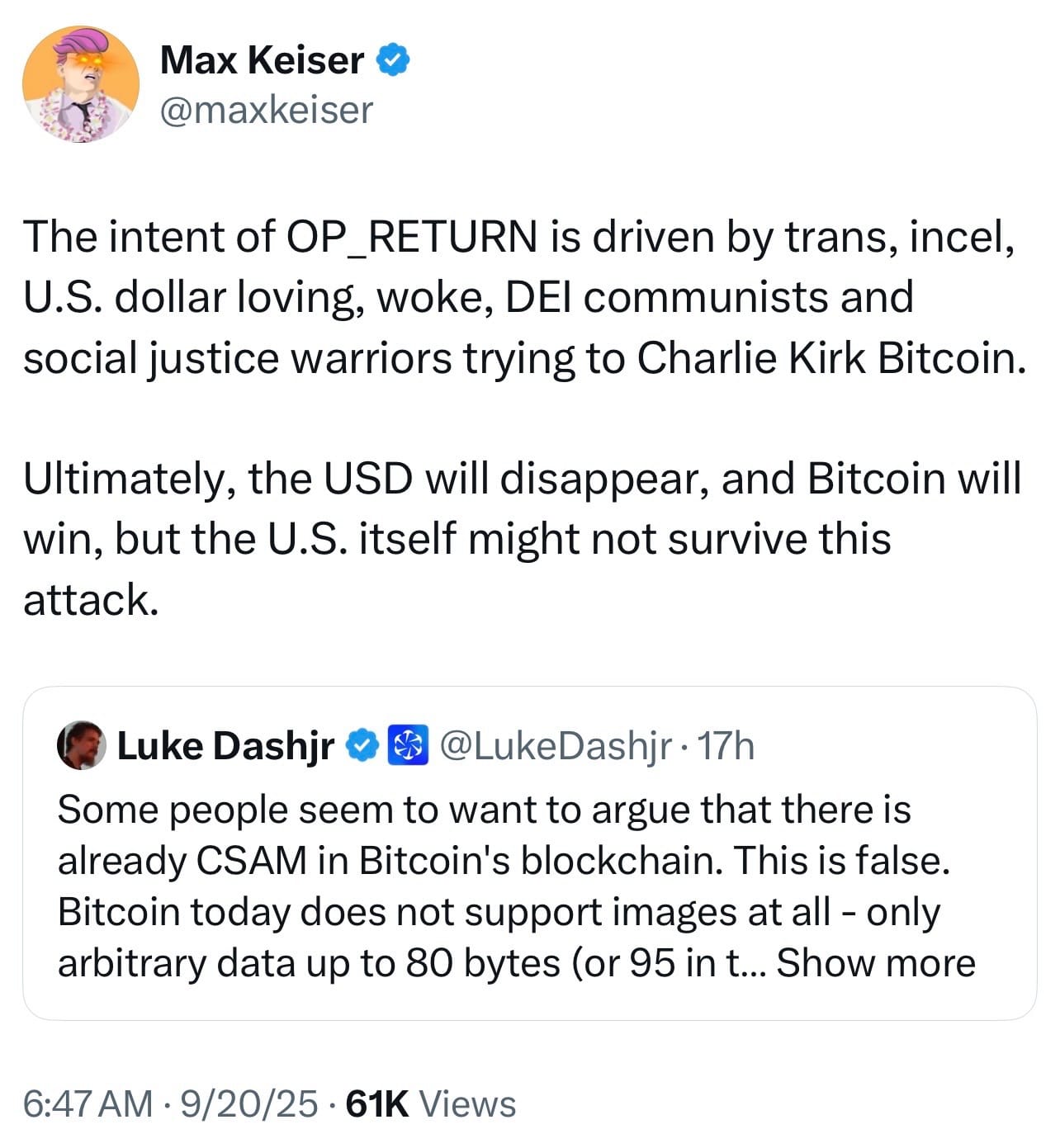Max Keiser Claims OP_RETURN Driven by Woke Activists to “Charlie Kirk Bitcoin”

The Bitcoin blockchain has long served as a foundation for secure financial transactions, but a recent exchange on social media has pulled the network into unfamiliar territory. Prominent advocate Max Keiser shared a pointed view on the OP_RETURN function, a technical element that permits limited data storage in transactions.
His controversial remarks, posted on September 20, 2025, tied the feature to broader cultural and political tensions, specifically surrounding the recent death of Charlie Kirk, drawing quick responses from developers and users. This exchange highlights how even core protocol elements can stir passionate discussions within the community.

Keiser’s statement came in response to Bitcoin Core developer Luke Dashjr’s explanation of OP_RETURN’s role in data handling. He described the function’s development as influenced by groups he labeled as “trans, incel, U.S. dollar loving, woke, DEI communists and social justice warriors,” aiming to destroy Bitcoin’s essence in a manner he called “Charlie Kirk Bitcoin,” implying that OP_RETURN advocates want to kill off Bitcoin.
The post warned that such efforts could endanger not just the cryptocurrency but the United States as a whole. Over the following day, the comment amassed hundreds of likes and dozens of replies, amplifying voices on both sides of the issue.
Community Responses Reveal Deep Divisions
Users on X offered a range of views, with some echoing Keiser’s concerns about external influences on Bitcoin’s direction. One reply urged support for alternative implementations like Bitcoin Knots and Ocean Mining to resist what it termed “gay core devs and spammers.” Another framed the debate as an “ideological attack by woke devs,” calling for hash power directed toward specific mining pools to maintain the network’s independence. These positions reflect a subset of the community focused on preserving Bitcoin’s original monetary focus against perceived dilutions.
Others rejected the political angle outright, stressing that OP_RETURN has existed for over a decade as a straightforward technical tool. Developer Jameson Lopp added a touch of sarcasm, asking what steps Keiser planned to take against the supposed threat. BitMEX Research even floated the idea of a soft fork to restrict OP_RETURN outputs, while acknowledging its current role in transaction processing. While long time Bitcoin and crypto OG’s have dismissed Keiser entirely, saying he has always been a scammer, and some are just now realizing it.
The technical side of OP_RETURN traces back to 2014, when developers introduced it to allow up to 80 bytes of data in unspendable outputs. This design balanced the need for metadata, such as in smart contracts, against risks of blockchain bloat from excessive non-financial information. Recent proposals in Bitcoin Core version 30 aim to raise the relay limit to 100 kilobytes, sparking fresh worries about spam and resource strain on nodes.
Stay In The Loop and Never Miss Important Bitcoin News
Sign up and be the first to know when we publishIn practice, techniques like Inscriptions have already tested these boundaries by embedding larger files through protocol loopholes. Luke Dashjr clarified that the blockchain stores raw data, not interpretable images, placing responsibility on external software for any misuse. Yet this perceived nuance has not quelled fears, as seen in ongoing threads debating whether expanded limits invite more abuse or enable legitimate innovations.
Bitcoin’s history shows OP_RETURN enabling real-world applications beyond finance. Reports from Chainalysis in 2025 highlighted its use in wartime scenarios, where activists tagged addresses linked to military operations with intelligence notes. Such examples demonstrate the function’s value as a timestamping mechanism, even as critics point to potential for scams or unwanted content.
As discussions continue, the community grapples with balancing innovation and caution. Proposals for filters in alternative nodes like Knots have gained little traction among those wary of changes, while others argue for permissive policies to support broader adoption. Keiser’s controverial post has sharpened the focus on these tensions, reminding participants that Bitcoin’s path forward depends on collaborative, not destructive, dialogue.

